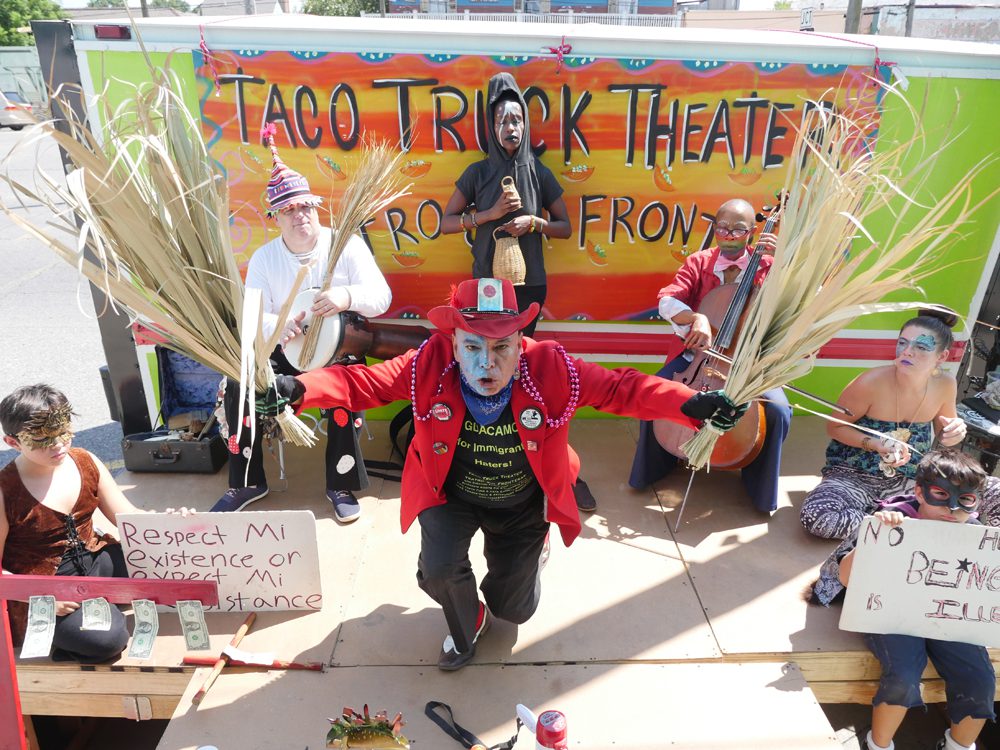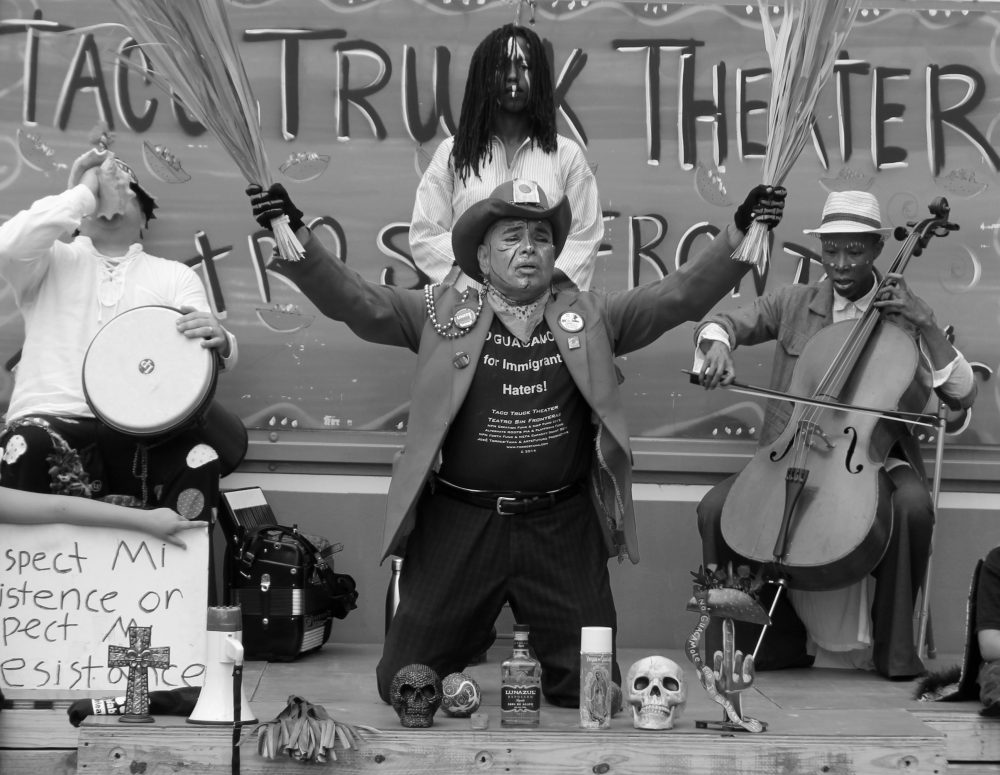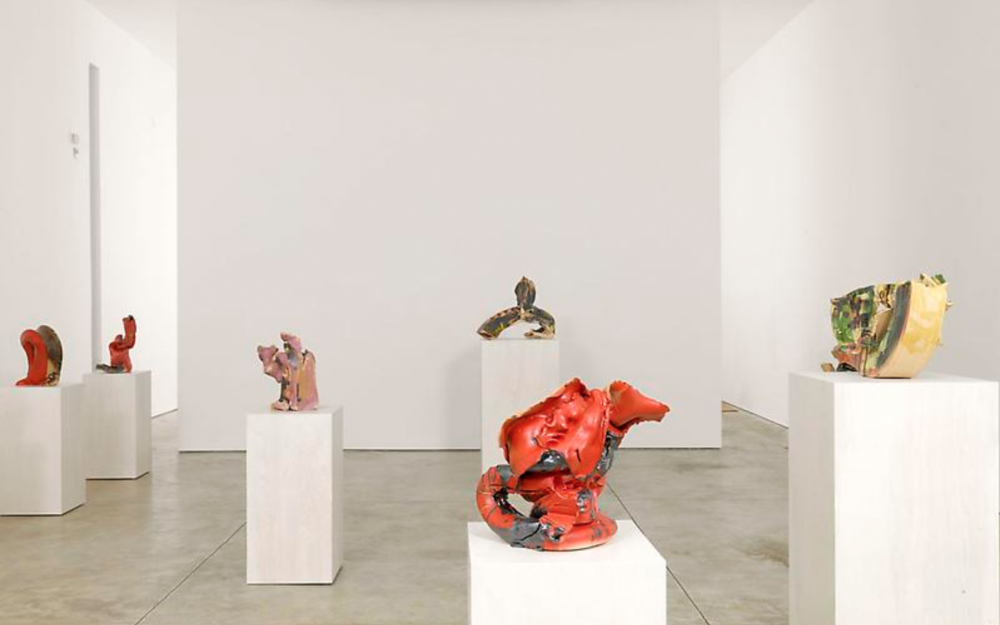A Future Without Borders: ArteFuturo Productions’ Taco Truck Theater
Tina Orlandini heads to the Art Garage for a performance by the Taco Truck Theater, organized by ArteFuturo Productions’ José Torres-Tama.

ArteFuturo Productions’ Taco Truck Theater. Courtesy ArteFuturo Productions. Photo by Rodrigo Dorfman.
It’s the evening of September 9, and crowds are forming in and around the Art Garage on St. Claude Avenue—one group flowing into the space, another blooming around Tacos by Heidi, a vegan-taco stand on the sidewalk outside. José Torres-Tama, performance artist and founder of ArteFuturo Productions, bounces between the registration table and a makeup artist who adds last-second touch-ups before the artist vanishes again. Taco Truck Theater/Teatro Sin Fronteras has already lived up to its description, a borderless performance that not only breaks the fourth wall, but seemingly doesn’t even acknowledge that a wall existed in the first place.
The show officially begins when ensemble members howl at the audience, inviting us to turn our attention to the entrance of Art Garage’s space. A taco truck, parked on the sidewalk, painted with the project’s title serves as the backdrop to a collapsible wooden stage, reminiscent of the project’s inspiration: Luis Valdez’s actos, short skits on mobile flatbed trucks sharing the plight of farmworkers in Los Angeles in the 1960s and ’70s as part of his Teatro Campesino. ArteFuturo Productions’ Taco Truck Theater project has been developing and evolving since 2013. The project fulfills Torres-Tama’s dream to manifest radical outdoor dinner theater as an homage to Valdez.
ArteFuturo performers include an incredibly talented crew of diverse, intergenerational, and multidisciplinary artists or “Super Beings,” as Torres-Tama calls them. In addition to Torres-Tama, the ensemble currently includes Monica “Spirit” McIntyre, Natalie “La Sirena” Jones, Michael “La Bestia” Ward-Bergeman, and Mwende “FreeQuency” Katwiwa and features Torres-Tama’s sons Darius and Diego Torres-Copeland. Collectively, the ensemble explores the personal and political with poetic grace, lyrical gravity, and occasional comedy.
Storytelling, poetry, and song are used to recall the dehumanization, policing, incarceration, and killing of Latinx immigrants and black people in the United States. In conversation with Torres-Tama, days before the first of just two stops by the Taco Truck Theater in New Orleans, he stresses the importance of receiving the work as both a collective performance ritual and an act of resistance against racism and oppression. The show speaks for itself with solo pieces by ensemble members who call for the audience to remember, to confront, and to heal from the United States’ long history of dehumanization.

ArteFuturo Productions’ Taco Truck Theater. Courtesy ArteFuturo Productions. Photo by Orestes Montero.
The performance starts with what Torres-Tama describes as “a petition to Elegua” and other orishas, to manifestations of God, or to another higher power—a ritualistic opening of the space. Soon after, the performance transitions into a cello solo by McIntyre, who plays their song “Somebody Call My Name,” written after the 2015 death of Sandra Bland in police custody. Simultaneously, Torres-Tama recalls the stories of black and brown men killed by police or in the custody of Immigration and Customs Enforcement, including “reconstruction workers” here in New Orleans, so called because of their work to rebuild homes and businesses after Hurricane Katrina. The performance then transitions into a spoken-word poem by Katwiwa, speaking as Bland with moving lines like “I forgot about the family trees missing limbs that look like me” and asking chilling questions like “What did I do to make you remember me?”
Although it includes a combination of works previously created by ensemble members and new work written especially for the Taco Truck Theater, the performance seamlessly uplifts individual voices within one collective narrative of resistance. Jones adopts Chilean musician Violeta Parra’s “Gracias a la vida,” singing in between a narrative performance in which she confronts her father’s voting for Donald Trump in the 2016 presidential election. Later, McIntyre delivers a pounding diagnosis of whiteness, including characteristics such as off-rhythm dancing, cultural appropriation, and guilt without further action.
In a conversation with McIntyre about this piece, they mentioned that comedy—such as the pairing of serious issues with more comical ones—comes naturally in their work. “Funny lives in me,” they said over the phone. The piece, written seven or eight days before its first performance earlier this year, was written specifically for Taco Truck Theater and came from McIntyre’s desire to explore the concept of whiteness and its expansive and systemic impact without necessarily attacking white people. McIntyre, who joined Taco Truck Theater nearly a year ago, felt the piece filled a gap in the performance by addressing whiteness directly.
Within just 80 minutes, Taco Truck Theater travels across spiritual planes, memory, and consciousness, recalling our country’s long history of oppression in order to avoid what Torres-Tama calls the “United States of Amnesia,” grounding us in this place and time by reminding us that the forthcoming tricentennial celebration of New Orleans likely won’t lift up the indigenous tribes and cultures that inhabited this land long before our city.
In additional to the Art Garage show, Taco Truck Theater made a stop on September 10 at Ashé Cultural Arts Center, and ArteFuturo is launching an Indiegogo campaign to support a tour to community spaces, churches, and non-traditional performance spaces throughout New Orleans, geared towards the city’s communities of color. I’m glad more of New Orleans will be able to experience the Taco Truck Theater—and that includes Heidi’s tacos!
Editor's Note
ArteFuturo Productions’ Taco Truck Theater presented two performances on September 9 and 10, 2017, at the Art Garage (2231 St. Claude Avenue) and Ashé Cultural Arts Center (1712 Oretha Castle Haley Boulevard) in New Orleans.



